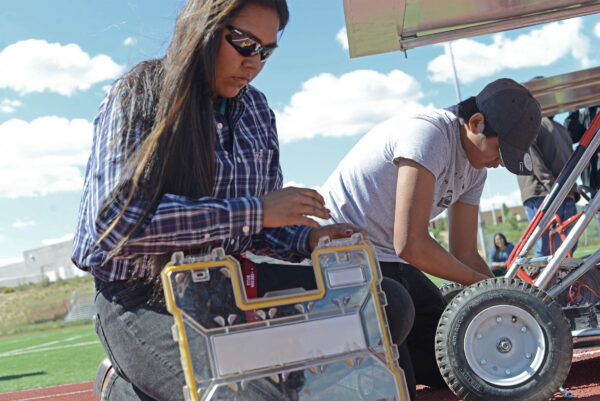
- Details
- By Rich Tupica
CROWNPOINT, N.M. – As the pandemic looms over Indian Country, educational institutions are continuously revamping their courses in order to accommodate stay-home protocol and protect students and faculty. One of those schools, Navajo Technical University (NTU), switched to an emergency distance education model after the COVID-19 spiked back in March.
Now, months later, the university’s summer programs have also switched to online, including the annual Leadership, Enrichment, Advancement Program (L.E.A.P.) and the Summer STEM and Skills Program. Each program has been in operation for the last several years and targets high school students and recent graduates. “This is our first virtual L.E.A.P.,” said advisor Sherietta Martinez Brown, noting that 12 of the program’s first 13 participants successfully completed their first year at NTU. “We are hoping that we are able to prepare students for the upcoming fall semester as much as possible with a limited time.” Now in its second year, L.E.A.P. was designed for recent high school graduates. The program, which runs June 15 to July 17, functions as a summer bridge program that eases students into college coursework. Students can earn up to eight credit hours in the program, which covers reading and writing skills, intermediate algebra and college success skills. Both the Summer STEM and Skills program and L.E.A.P. are free to students with tuition, books and fees covered by NTU, however students are required to have access to the Internet and a computer for each program. Students participating in L.E.A.P. will be provided with a computing device. Registration for each program is currently open. Orientation for L.E.A.P. is June 12 from 8 a.m. to noon.
Launched in 2018, the Summer STEM and Skills program introduces dual credit students to the fields of construction, welding, culinary arts, baking, automotive technology, pre engineering, and business. While previous years emphasized experiential education within a four week learning period, this year’s entirely-online program spans six weeks, from June 15 to July 24. High school students can earn up to 9 credit hours if they complete the program. For more information about L.E.A.P, contact Sherietta Martinez Brown at NTU. For questions regarding Summer STEM and Skills enqueries, email Freda Joe.
More Stories Like This
10 Years of Building Business Dreams for Indigenous WomenIchigo Foundation Awards American Indian College Fund Adult Education Program
Bard College Center for Indigenous Studies (CfIS) Hosts Annual Symposium With Keynote Speaker Miranda Belarde-Lewis on March 9–10
American Indian College Fund Announces Spring 2026 Faculty Fellow Cohort
Navajo Nation Signs $19 Million Diné Higher Education Grant Fund Act into Law
Help us defend tribal sovereignty.
At Native News Online, our mission is rooted in telling the stories that strengthen sovereignty and uplift Indigenous voices — not just at year’s end, but every single day.
Because of your generosity last year, we were able to keep our reporters on the ground in tribal communities, at national gatherings and in the halls of Congress — covering the issues that matter most to Indian Country: sovereignty, culture, education, health and economic opportunity.
That support sustained us through a tough year in 2025. Now, as we look to the year ahead, we need your help right now to ensure warrior journalism remains strong — reporting that defends tribal sovereignty, amplifies Native truth, and holds power accountable.
 The stakes couldn't be higher. Your support keeps Native voices heard, Native stories told and Native sovereignty defended.
The stakes couldn't be higher. Your support keeps Native voices heard, Native stories told and Native sovereignty defended.
Stand with Warrior Journalism today.
Levi Rickert (Potawatomi), Editor & Publisher
